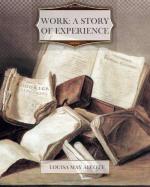Being women, of course they talked as industriously as they worked; fingers flew and tongues clacked with equal profit and pleasure, and, by Saturday, Christie had made up her mind that Mrs. Wilkins was the most sensible woman she ever knew. Her grammar was an outrage upon the memory of Lindley Murray, but the goodness of her heart would have done honor to any saint in the calendar. She was very plain, and her manners were by no means elegant, but good temper made that homely face most lovable, and natural refinement of soul made mere external polish of small account. Her shrewd ideas and odd sayings amused Christie very much, while her good sense and bright way of looking at things did the younger woman a world of good.
Mr. Wilkins devoted himself to the making of shoes and the consumption of food, with the silent regularity of a placid animal. His one dissipation was tobacco, and in a fragrant cloud of smoke he lived and moved and had his being so entirely that he might have been described as a pipe with a man somewhere behind it. Christie once laughingly spoke of this habit and declared she would try it herself if she thought it would make her as quiet and undemonstrative as Mr. Wilkins, who, to tell the truth, made no more impression on her than a fly.
“I don’t approve on’t, but he might do wuss. We all have to have our comfort somehow, so I let Lisha smoke as much as he likes, and he lets me gab, so it’s about fair, I reckon,” answered Mrs. Wilkins, from the suds.
She laughed as she spoke, but something in her face made Christie suspect that at some period of his life Lisha had done “wuss;” and subsequent observations confirmed this suspicion and another one also,—that his good wife had saved him, and was gently easing him back to self-control and self-respect. But, as old Fuller quaintly says, “She so gently folded up his faults in silence that few guessed them,” and loyally paid him that respect which she desired others to bestow. It was always “Lisha and me,” “I’ll ask my husband” or “Lisha ’ll know; he don’t say much, but he’s a dreadful smart man,” and she kept up the fiction so dear to her wifely soul by endowing him with her own virtues, and giving him the credit of her own intelligence.
Christie loved her all the better for this devotion, and for her sake treated Mr. Wilkins as if he possessed the strength of Samson and the wisdom of Solomon. He received her respect as if it was his due, and now and then graciously accorded her a few words beyond the usual scanty allowance of morning and evening greetings. At his shop all day, she only saw him at meals and sometimes of an evening, for Mrs. Wilkins tried to keep him at home safe from temptation, and Christie helped her by reading, talking, and frolicking with the children, so that he might find home attractive. He loved his babies and would even relinquish his precious pipe for a time to ride the little chaps on his foot, or amuse Vic with shadow rabbit’s on the wall.




